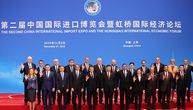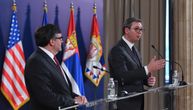Serbia protects its interests as an equal: Djuric on details from the Vucic-Palmer meeting
Djuric added that the president of Serbia "confronted" Palmer with facts in a direct and responsible manner
Director of the Office for Kosovo and Metohija Marko Djuric says that President Aleksandar Vucic presented to US Special Envoy for the Western Balkans Matthew Palmer a list of objections to Pristina's behavior, and of the obligations that Pristina has failed to fulfil in the previous years.
He said that 2,387 days had passed during which Pristina has not been implemented the Agreement on the Community of Serb Municipalities, and that the conversation with Palmer was an opportunity to ask what the international community has done about implementing the signed agreements.
"It was a conversation in which Serbia protected its interests as an equal, while protecting its dignity, even though we know that the United States, as an unprecedented military and politically powerful country, has been supporting Kosovo's independence for two decades," Duric told TV Pink.
He added that the president "confronted" Palmer with facts in a direct and responsible manner, citing as one of the examples the formation of the so-called Kosovo army, where Pristina violated not only international regulations, but also the so called constitution of Kosovo.
He stated that the president pointed out to the position of Serbs in Kosovo, where Pristina is trying to redraw the electoral will of the Serbs who opted to vote for the Serb List, that Pristina tried to marginalize them.
Djuric said that Serbia's responsible position in strengthening cooperation in the region is respected and recognized, and that the freedom of movement of goods, people, capital and services to should be introduced at last.
The head of the Office for Kosovo and Metohija recalled the situation regarding Kosovo that the current government encountered when it came to power. He said that on September 28, 2007, Boris Tadic, then president, spoke directly with representatives of so-called Kosovo, and that same year Martti Ahtisaari proposed supervised independence as a solution.
He further said that on November 5, 2007, the government in Belgrade proposed a Hong Kong model, which was rejected, followed by Kosovo declaring independence on February 17, 2008.
He recalled that on August 15, 2008, then Foreign Minister Vuk Jeremic formally submitted to the UN General Assembly a request to allow Serbia to seek the advisory opinion of the International Court of Justice on the question, "Is the unilateral declaration of independence of Kosovo legal?"
"A question is being posed to a court where most judges are politically elected by governments that support Kosovo's independence. In July 2010, the International Court of Justice issued an opinion that unilaterally declaring independence was not contrary to international law," Djuric reminds.
He stresses that on September 9, 2010, during the UN General Assembly, at the proposal of then authorities in Serbia UNMIK was removed and the mediator in the dialogue became the EU. Until mid-2012, the negotiating team was headed by Borko Stefanovic, and during this time the customs stamp was introduced, and agreements on cadastre, on regional cooperation reached.
"And now they're telling someone else that they betrayed something. Vuk Jeremic is the last person on the planet who could talk like that," Djuric concluded.
Video: Former CIA operative for the Balkans: Give Kosovo, ask for the Serb Republic
(Telegraf.rs/Tanjug)

